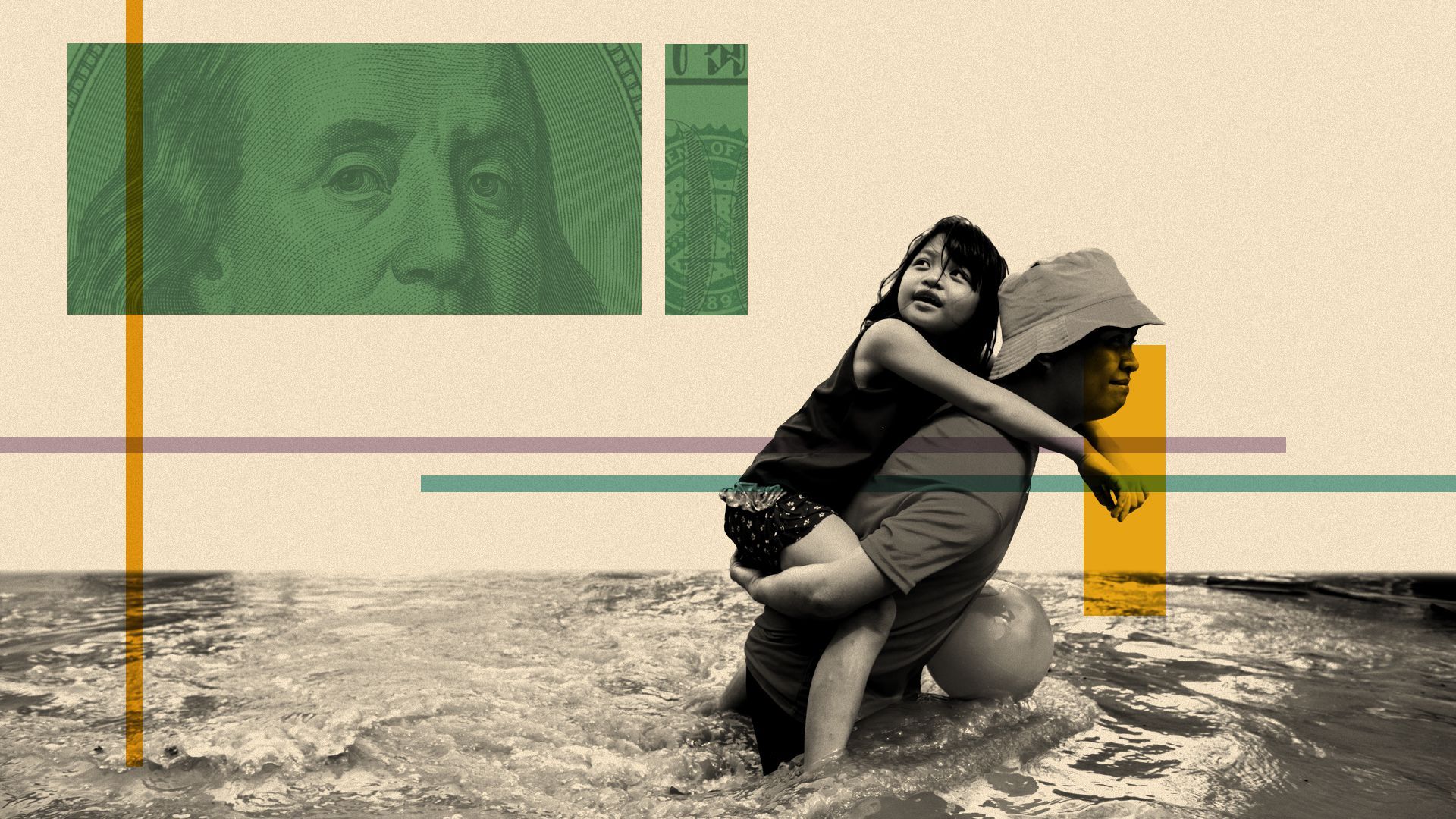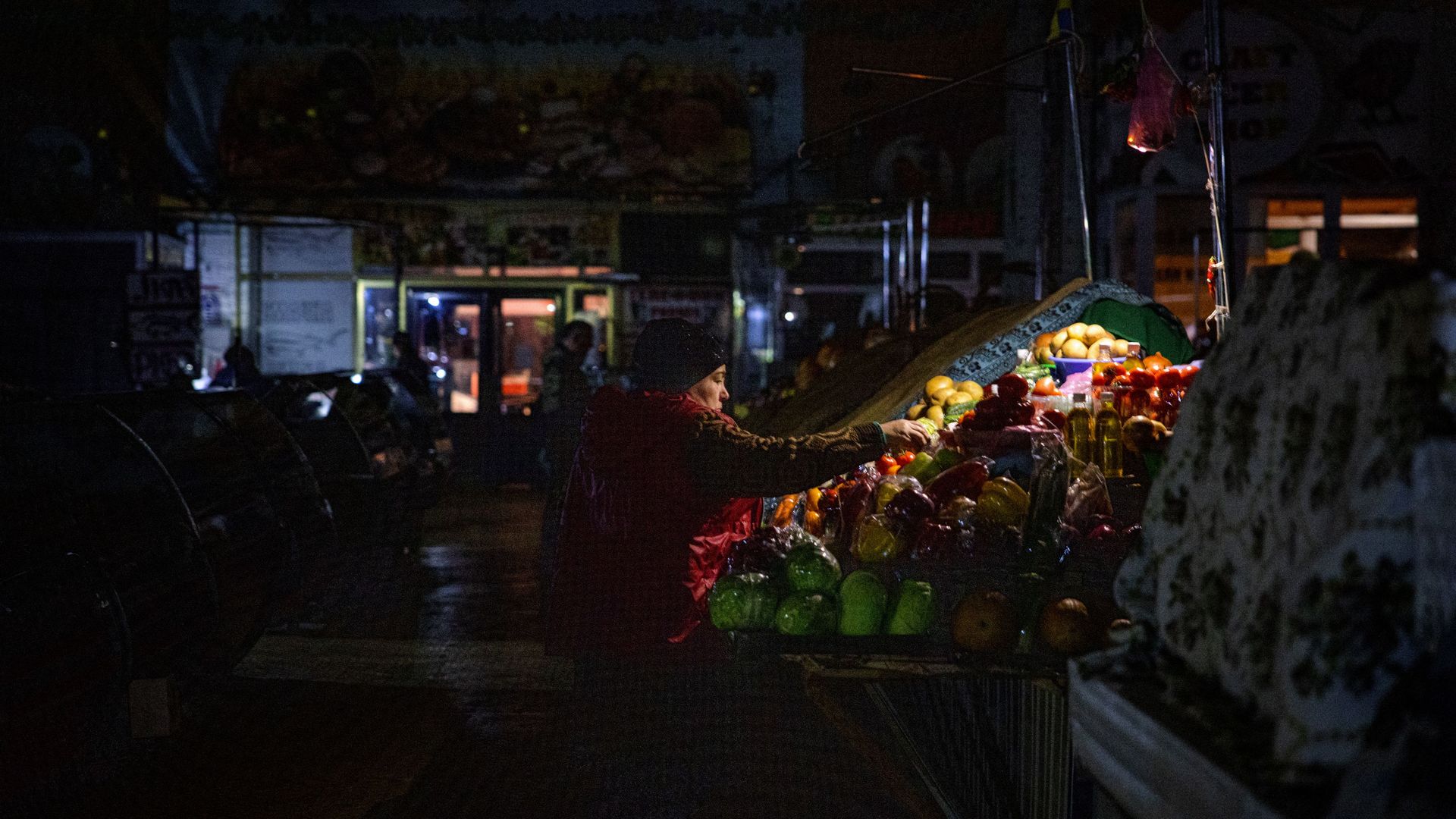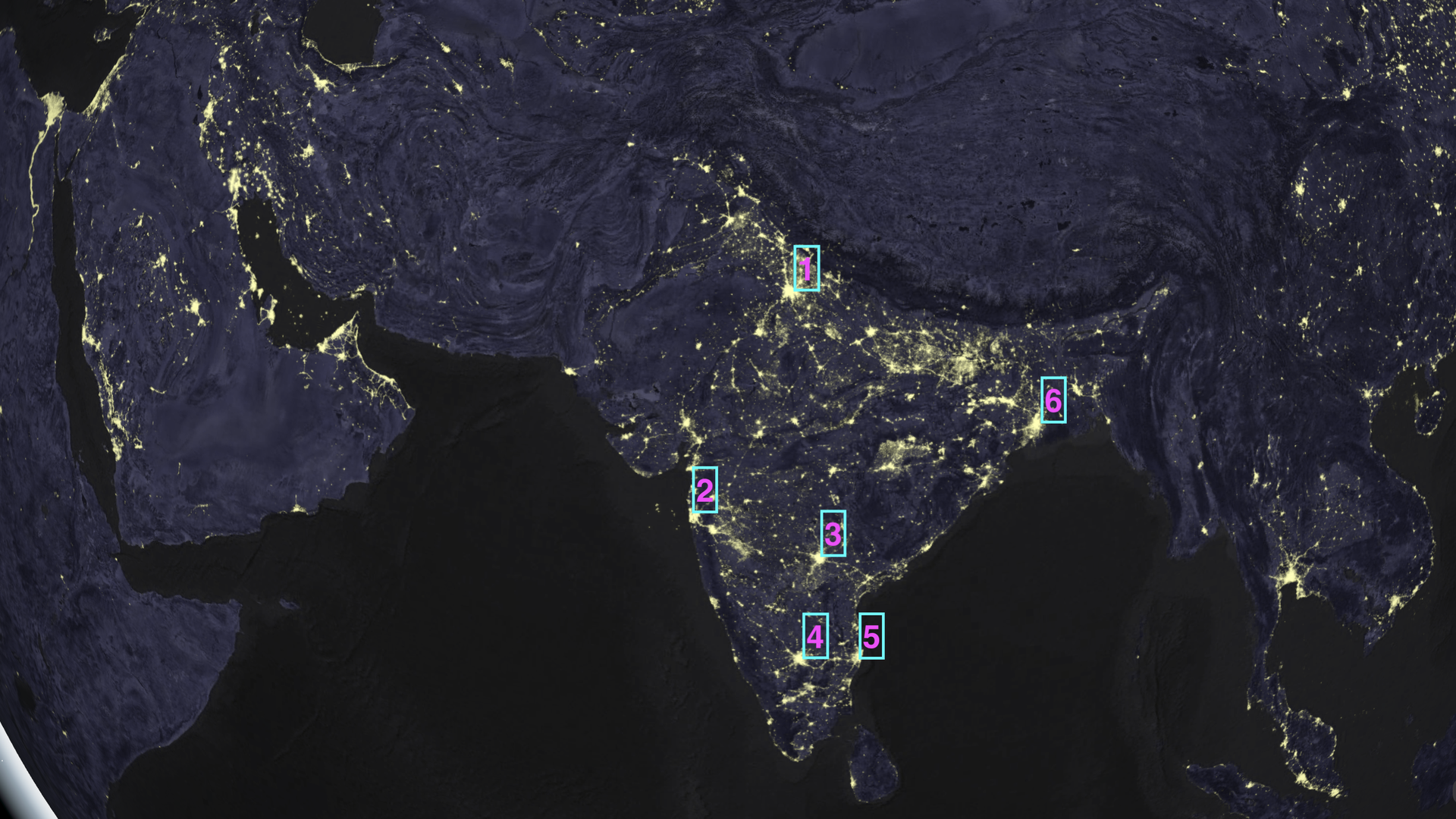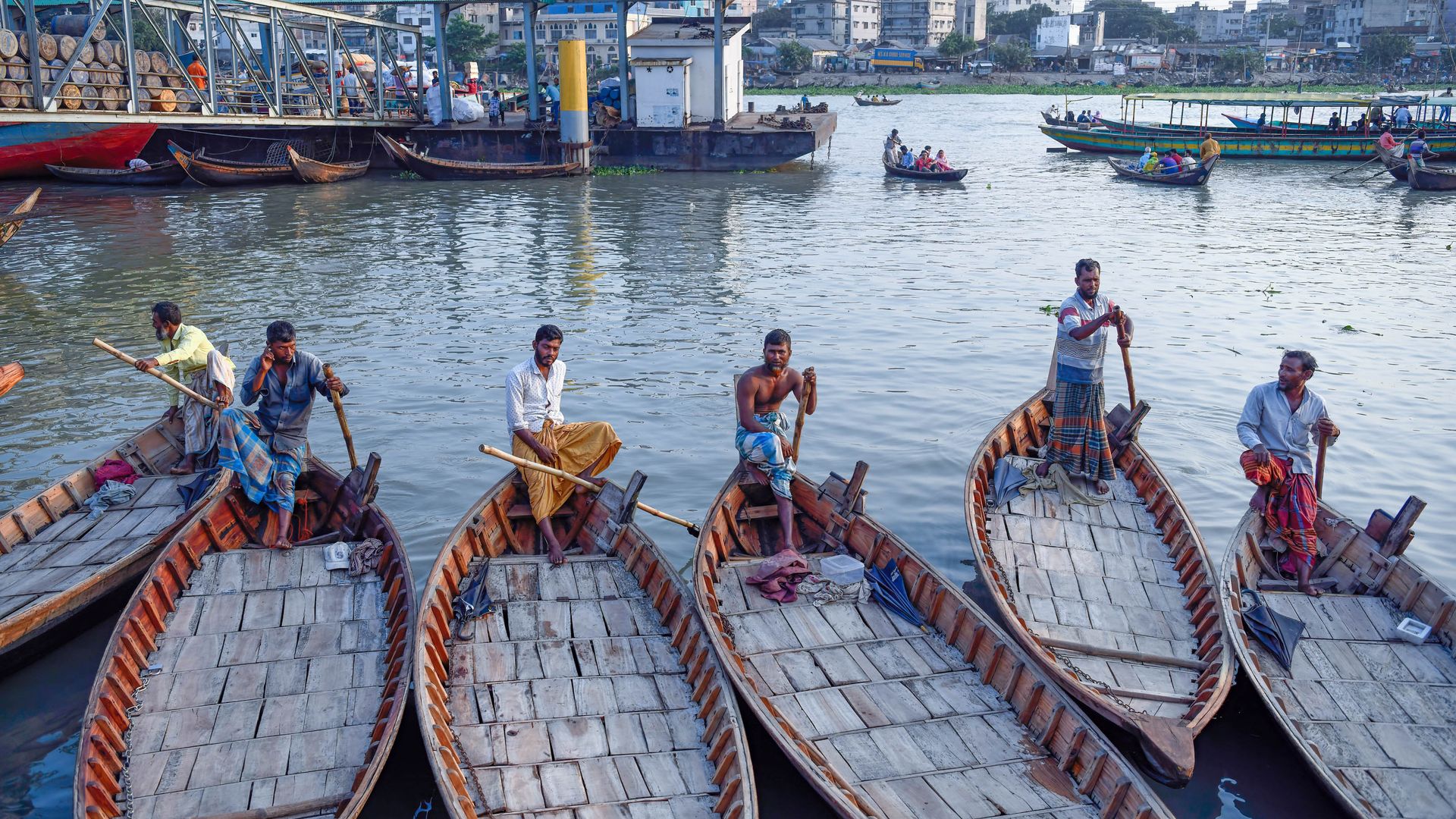| | | | | | | Presented By Babbel | | | | Axios World | | By Dave Lawler · Nov 10, 2022 | | Welcome back to Axios World. - Tonight's edition (1,926 words, 7 minutes) starts with a big climate conundrum before making stops in Kyiv, Bali, Cuba and more.
New arrival? Subscribe. | | | | | | 1 big thing: Recession fears could slow needed climate cash |  | | | Photo illustration: Sarah Grillo/Axios. Photo: Jes Aznar/Getty Images | | | | The huge gap between the sums needed for developing countries to transition to renewable energy sources and adapt to climate change — estimated at $1 trillion in external funding per year — and current funding levels (half that, at most) has been a central focus of the COP27 climate conference. Why it matters: Experts, activists and leaders from vulnerable countries have been warning of dire consequences if much more money doesn't flow much more quickly. But with countries and companies staring down a potential global recession, investment levels could actually decrease. - Donor countries aren't willing or able to fill the gap. They're still struggling to cobble together the $100 billion in annual climate finance they promised by 2020.
- Aid budgets, particularly in Europe, have been stretched by the war in Ukraine, and more cutbacks are likely in an economic downturn, according to Ani Dasgupta, CEO of the World Resources Institute.
- The sums pledged so far by countries for various initiatives at COP27 have often been in the tens of millions, several orders of magnitude below what vulnerable countries need, Axios' Andrew Freedman reports.
- Hopes to fill the gap therefore lie largely with the private sector. Hence U.S. climate envoy John Kerry's new plan to fund investments in developing countries by selling carbon credits to corporate heavyweights.
While many big companies are genuinely committed to taking action on climate — in part due to pressure from their employees and customers — the sums they dedicate to philanthropy and burnishing their green credentials won't get you anywhere near $1 trillion per year, notes a senior executive from a Fortune 500 company who's attending COP27. "That's going to come from investments." - Yes, but: "This conference is happening at a time when [interest] rates are going up in the U.S. and around the world," says the executive, who requested anonymity to speak candidly. "Capital is likely to flow out of developing countries and into safe havens like the U.S."
- "So while there's a lot of conversation here about the need to invest in green infrastructure in Africa and a variety of renewable energy projects, that's the context in which those investment decisions are going to be made."
- "This is something that can't just be put on the back burner for a few years until we see where rates sort out. But it puts a premium on all the other factors that go into making those decisions." Those factors include efforts from development banks and other international actors to de-risk green infrastructure investments to draw in more cash.
What to watch: With both public and private finance lagging behind what's needed, Barbados Prime Minister Mia Mottley presented a plan at COP27 — since endorsed by other leaders including French President Emmanuel Macron and, more cautiously, IMF chief Kristalina Georgieva — to revolutionize the roles of the IMF and World Bank to drastically increase the sums available for climate finance. - Some close observers are watching whether Mottley's proposals get any traction during negotiations at COP27 or at the upcoming G20 summit, Andrew reports.
|     | | | | | | 2. Ukraine struggles to keep the lights on |  | | | Shopping in a blackout, in Kyiv. Photo: Dimitar Dilkoff/AFP via Getty Images | | | | Ukrainian forces entered newly liberated towns around the southern city of Kherson today after Russia announced it would be abandoning the only regional capital it took after invading in February. Yes, but: "When Russia falls on the battlefield, they're trying to destroy the energy grid" and life for civilians in Ukraine's cities, Ukrainian Economy Minister Yulia Svyrydenko told reporters Wednesday at Ukraine's embassy in Washington. - Households and businesses alike in Kyiv are facing blackouts of at least six hours per day as a result of Russian attacks, and the situation will grow more dangerous as the weather gets colder.
- In her meetings with U.S. officials, "several questions were asked about scenarios from our government side, how many people can be evacuated from the biggest cities — abroad or not abroad," Svyrydenko said.
- But she says Ukraine's government and people are focused on adapting, not leaving. When facilities are struck, utility workers scramble to repair the damage and restore power as quickly as possible. "Right now, they're our heroes," Svyrydenko says.
While in D.C., she also raised the need for generators, transformers and more efficient LED bulbs to conserve energy. - Kyiv is even running out of candles. When Svyrydenko stopped in Poland before flying to the U.S., she bought advent candles in a shop to send home.
The primary focus of Svyrydenko's visit to Washington was seeking help to cover a $38 billion hole in Ukraine's budget after the invasion, as well as an estimated $17 billion needed for initial rebuilding. - She said the government is also reducing staff and seeking to privatize some smaller state-owned companies to cut costs.
- After Russia's latest attacks on key infrastructure, the economy is expected to contract by 39% this year, up from a previous estimate of 35%, Svyrydenko said.
- Svyrydenko, who is also vice prime minister, said she finds the discussion about a Republican-controlled House blocking aid to Ukraine "a little strange" because it's so desperately needed, but said she trusts Biden's promise to support Ukraine "as long as it takes."
|     | | | | | | 3. Biden's big trip |  Data: White House; Map: Alice Feng/Axios Biden will depart this evening for the COP27 climate conference in Sharm El-Sheikh, Egypt, where he'll give a speech tomorrow and also meet with Egyptian President Abdel Fattah el-Sisi. - A senior U.S. official told reporters Biden will raise human rights with Sisi, but didn't say whether he'll specifically call for the release of writer Alaa Abd El-Fattah and other political prisoners.
Next up is the ASEAN summit in Cambodia — another tricky meeting on Saturday with another authoritarian host, Prime Minister Hun Sen. Southeast Asia has been a major area of focus for the Biden administration in its competition with China. - While in Phnom Penh, Biden will meet Sunday with the presidents of Japan and South Korea to discuss their responses to North Korea's flurry of missile tests.
- Then he'll fly to Bali and meet with Indonesian President and G20 host Joko Widodo.
The main event will be Monday in Bali: Biden's first in-person meeting with Chinese President Xi Jinping since becoming president. - The White House expects the meeting to cover tensions over Taiwan, North Korea's recent missile launches, the war in Ukraine and climate change. Biden will also raise China's "human rights violations" and "harmful economic practices," a senior administration official told reporters.
- Both leaders will be heading to Bali after clearing major political hurdles: the U.S. midterm elections, which went better than expected for Biden; and the Chinese Communist Party Congress, at which Xi secured a third term.
- More on the meeting
Worth noting: Putin removed a potential headache for Biden by announcing yesterday that he won't travel to Bali. |     | | | | | | A message from Babbel | | The easy way to connect with anyone from (almost) anywhere | | |  | | | | With Babbel in your back pocket, language barriers won't keep you from meeting new people. What you need to know: Across 10-minute expert-curated language lessons, you could learn to have real-world conversations in 1 of 14 languages in just three weeks. Get up to 55% off your subscription. | | | | | | Bonus: Where in the world? |  | | | Screengrab via Apple Maps? | | | | Labeled above are six Indian megacities, all with metro populations over 10 million. Can you name them? Some hints: - 1 is home to India's capital, while 2 is the home of Bollywood.
- 3 and 4 are tech hubs, nicknamed "Genome Valley" and "India's Silicon Valley," respectively.
- 5, South India's major cultural center, used to be called Madras, while 6 also went by a different name (or spelling) when it was capital of the British Raj.
Scroll to the bottom for answers. |     | | | | | | 4. Global news roundup |  | | | Internally displaced people stand in the entrance of a shelter in the Hagare Hoos IDP camp, one of more than 500 that surround Baidoa, Somalia, on Nov. 9. Millions in Somalia are at risk of severe hunger or famine due to a prolonged drought. Photo: Guy Peterson/AFP via Getty Images | | | | Axios' Laurin-Whitney Gottbrath rounds up the global headlines. 1. The Taliban this week announced that women and girls will not be allowed to visit Afghanistan's gyms and parks, AP reports. - The big picture: Mohammed Akef Mohajer, spokesperson for the Ministry of Virtue and Vice, claimed the Taliban had "tried its best" to avoid closing parks and gyms to women and girls, but segregation orders and rules "were not obeyed." Go deeper.
2. World Health Organization chief Tedros Adhanom Ghebreyesus said yesterday that a week after the peace deal between Ethiopia's government and Tigray forces, "nothing is moving in terms of food aid or medicines" to the northern Ethiopia region. - Peace talks between the two parties continued today, focusing on the disarmament of Tigray's forces and the resumption of aid deliveries and basic services, AP reports.
3. The European Court of Human Rights blocked a man's extradition to China last month in a landmark case that could make any future extraditions from Europe to China extremely unlikely, Axios' Bethany Allen-Ebrahimian reports. 4. The U.K. has frozen more than £18 billion (nearly $21 billion) worth of Russian assets since the start of Moscow's invasion of Ukraine, Axios' Ivana Saric writes, based on an annual report published by the U.K.'s Office of Financial Sanctions Implementation. 5. Israel's outgoing Defense Minister Benny Gantz said yesterday that Israel has the capability to conduct a military operation against Iran's nuclear facilities, Axios' Barak Ravid reports. |     | | | | | | 5. One to watch: A Cuba pivot after the midterms? |  | | | Barack Obama with Cuba's then-President Raúl Casto at a baseball game in Havana in 2016. Photo: Chip Somodevilla/Getty Images | | | | Tuesday was a decent night for the Democrats — except in Florida, where Gov. Ron DeSantis and Sen. Marco Rubio won by 19 and 16 points, respectively. It's looking more and more like a solid red state. What to watch: Biden's Cuba policy has been fairly hawkish, likely in large part to appeal to voters in South Florida, but his foreign policy advisers generally are not. - If the White House decides Florida is now out of reach politically, will they be more willing to attempt an Obama-style opening with Havana?
- The administration is already softening its stance toward Venezuela, with the push to pump oil apparently trumping political considerations.
- Still, Kerry's chat with Nicolás Maduro at COP27 was hard to square with the fact that the Venezuelan leader is officially wanted in the U.S. for "narco-terrorism."
Worth noting: The UN General Assembly voted 185-2 last week to condemn the U.S. embargo of Cuba for the 30th year in a row. |     | | | | | | 6. What I'm listening to: "The Last Cup" |  | | | Image: Jesse Brown/NPR. Courtesy of NPR | | | | A small kid with an otherworldly talent from a working class family leaves for Spain at 13 during a tumultuous period in his native Argentina, in part to fund the treatment he needs for a hormone deficiency. - Coaches and scouts in Argentina lose track of him until a video surfaces of him playing for Barcelona's youth team, running circles around the competition.
- Both his home country and his adopted one want to claim him, but while he chooses to play internationally for Argentina, he often struggles to perform for his country the way he does for his club, Barcelona. Some Argentinian fans turn against their native son, possibly the greatest soccer player ever.
- That's the story of Lionel Messi, as told in a new podcast from NPR called "the Last Cup." I started listening today as I gear up for the World Cup after my colleague Marina recommended it in Axios Latino.
What to watch: Messi finally won a trophy for Argentina last year, the Copa América. But can he win the biggest trophy of all in his last attempt? - The tournament kicks off on Nov. 20 in Qatar, and I'll be covering it in this newsletter.
|     | | | | | | 7. Stories we're watching |  | | | Boatmen wait for passngers in Dhaka, Bangladesh. Photo: Piyas Biswas/SOPA Images/LightRocket via Getty Images | | | - The COP27 agenda for young African climate activists
- What Brittney Griner could face in a Russian penal colony
- Putin to skip G20
- Abbas rejects U.S. request on UN resolution over Israeli occupation
- U.S. concerned about possible Netanyahu defense chief pick
- Jordan braces for Netanyahu
- Deadly quake strikes Nepal
Quoted: "If I support the decision and say that the Defense Minister is acting correctly by leaving Kherson, then I'm publicly calling for Russia's territorial integrity to be violated. In our Criminal Code that's Article 280 Part 1. I specifically checked this morning. Several years in prison. And if I don't support the decision... then I'm publicly discrediting the armed forces, which is also Article 280 but Part 3, with approximately the same jail term." — Russian TV host Andrei Norkin, per the BBC |     | | | | | | A message from Babbel | | Language lessons you can use in the real world | | |  | | | | Language learning platform Babbel offers 10-minute lessons that are proven to help users learn a new language in just three weeks. How it's done: Instead of random phrases, you'll learn to hold real-world conversations with expert-curated lessons and more. Get up to 55% off your subscription | | | | Answers: 1. Delhi; 2. Mumbai; 3. Hyderabad; 4. Bangalore; 5. Chennai; 6. Kolkata |  | | Are you a fan of this email format? It's called Smart Brevity®. Over 300 orgs use it — in a tool called Axios HQ — to drive productivity with clearer workplace communications. | | | | | | Axios thanks our partners for supporting our newsletters. If you're interested in advertising, learn more here.
Sponsorship has no influence on editorial content. Axios, 3100 Clarendon Blvd, Arlington VA 22201 | | | You received this email because you signed up for newsletters from Axios.
Change your preferences or unsubscribe here. | | | Was this email forwarded to you?
Sign up now to get Axios in your inbox. | | | | Follow Axios on social media:    | | | | | |
No comments:
Post a Comment